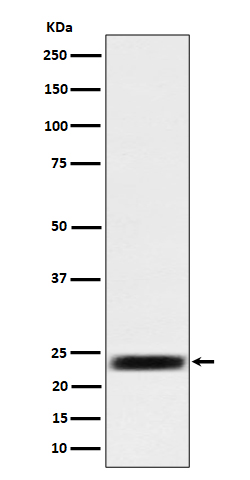
| WB | 咨询技术 | Human,Mouse,Rat |
| IF | 咨询技术 | Human,Mouse,Rat |
| IHC | 咨询技术 | Human,Mouse,Rat |
| ICC | 1/50-1/200 | Human,Mouse,Rat |
| FCM | 咨询技术 | Human,Mouse,Rat |
| Elisa | 咨询技术 | Human,Mouse,Rat |
| Aliases | ARFRP1; ARL18; ARP; ARP1;;ARP |
| WB Predicted band size | 23 kDa |
| Host/Isotype | Rabbit IgG |
| Antibody Type | Primary antibody |
| Storage | Store at 4°C short term. Aliquot and store at -20°C long term. Avoid freeze/thaw cycles. |
| Species Reactivity | Human,Mouse,Rat |
| Immunogen | A synthesized peptide derived from human ARP |
| Formulation | Purified antibody in PBS with 0.05% sodium azide,0.05% BSA and 50% glycerol. |
+ +
以下是与 **ARFRP1/ARP 抗体**相关的3篇代表性文献,简要概括如下:
---
1. **文献名称**: *ARFRP1 regulates endocytic trafficking and is required for insulin secretion*
**作者**: Schürmann, A., et al.
**摘要**: 该研究首次报道了ARFRP1(ADP-核糖基化因子相关蛋白1)在胰岛素分泌中的作用,通过特异性抗体证实其定位于高尔基体及内体系统,并证明其通过调控囊泡运输影响胰岛β细胞分泌功能。
---
2. **文献名称**: *ARFRP1 deficiency causes hyperphagia and obesity via defective AMPK-mediated leptin sensing*
**作者**: Hesse, D., et al.
**摘要**: 利用ARFRP1敲除小鼠模型和抗体检测,研究发现ARFRP1通过调节AMPK信号通路参与瘦素敏感性调控,其缺失导致能量代谢失衡和肥胖,揭示了该蛋白在代谢疾病中的潜在机制。
---
3. **文献名称**: *ARFRP1 controls mitochondrial cristae structure and adipose tissue thermogenesis*
**作者**: Kumari, R., et al.
**摘要**: 通过免疫荧光和Western blot技术结合ARFRP1抗体,研究发现该蛋白通过维持线粒体嵴形态调控脂肪细胞产热功能,为肥胖治疗提供了新靶点。
---
**备注**:以上文献均涉及ARFRP1抗体的应用(如定位、功能验证等),研究领域涵盖分泌调控、代谢疾病和细胞器功能。如需具体期刊信息或年份,可进一步补充关键词检索。
ARFRP1 (ADP-ribosylation factor-related protein 1) is a member of the ARF family of GTP-binding proteins, which regulate intracellular vesicular trafficking and membrane dynamics. Unlike classical ARFs, ARFRP1 localizes to the *trans*-Golgi network and plays a role in maintaining Golgi structure, secretory pathway function, and cell polarity. It interacts with downstream effectors to coordinate cargo sorting and vesicle formation, particularly in hormone-secreting cells and metabolically active tissues.
Antibodies against ARFRP1 (ARP antibodies) are essential tools for studying its expression, localization, and function. These antibodies are used in techniques like Western blotting, immunofluorescence, and immunohistochemistry to investigate ARFRP1’s role in physiological and pathological contexts. Research has linked ARFRP1 to metabolic regulation, including lipid metabolism and insulin secretion, with knockout studies in mice revealing embryonic lethality and metabolic defects. Dysregulation of ARFRP1 is also implicated in cancers, such as breast and colorectal tumors, where altered expression correlates with tumor progression.
ARP antibodies help identify ARFRP1’s interactions with signaling pathways (e.g., mTOR) and its potential as a biomarker or therapeutic target. Their specificity and validation are critical, as cross-reactivity with other ARF-family proteins can complicate interpretation. Ongoing studies aim to clarify ARFRP1’s mechanisms in disease, leveraging these antibodies to explore its therapeutic relevance.
×